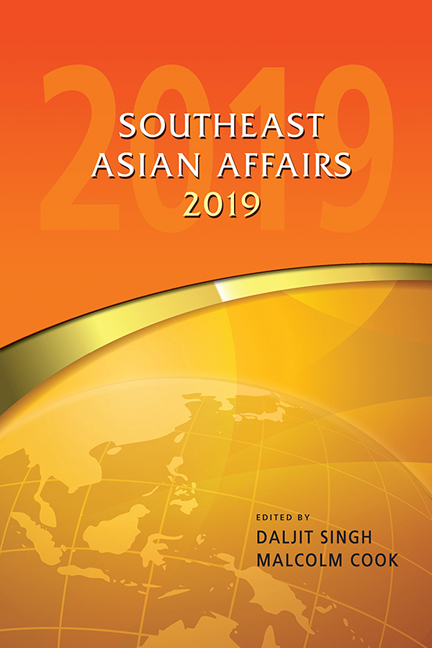Malaysia in 2018: The Year of Voting Dangerously
from MALAYSIA
Published online by Cambridge University Press: 07 September 2019
Summary
And when I went in the room with all these thoughts of, okay, what I do next might actually change the nation, I started to shake.
– Jean VaneishaIf a week is a long time in politics, what of an entire year? Malaysians embarking on an extended holiday at the beginning of 2018 would have returned to a deeply disorienting socio-political landscape at year's end. They would have had to absorb the fact that the once-mighty Barisan Nasional political alliance now lay in tatters, with former prime minister Najib Razak facing thirty-eight criminal charges of fraud, corruption and money laundering related to the 1Malaysia Development Berhad (1MDB) scandal. They would be reading newspapers filled with daily pronouncements from nonagenarian Mahathir Mohamad, Malaysia's now-returned premier, supported by a cast of political players mostly unused to wielding federal power. Their shopping and dining receipts would be marked by the conspicuous absence of the goods and services tax (GST). Their friends, families and colleagues might speak of new expectations, whether in terms of future livelihoods, educational opportunities, inter-ethnic relations, or the rule of law. This chapter will discuss how this situation came to be, as well as its deeper significance for Malaysians and their neighbours.
Politics: A Glass Half Full?
The road to Malaysia's political upset arguably began in September 2016, when Mahathir cemented his break with the United Malays National Organisation (UMNO) by founding Parti Pribumi Bersatu Malaysia (Bersatu) on the 8th of the month, before literally joining hands with former political arch-rival Anwar Ibrahim the following day. Drawing in several disaffected Malay political heavyweights, including former deputy prime minister Muhyiddin Yassin, former Kedah chief minister Mukhriz Mahathir and former Negri Sembilan chief minister Rais Yatim, Bersatu acquired further mainstream credibility in March 2017 when the Pakatan Harapan coalition — with Anwar Ibrahim's approval — formally accepted Bersatu into its fold. Reconciliation was reinforced in July 2017 when Pakatan's leadership agreed on having Mahathir as its prime ministerial candidate, with Anwar as Pakatan's de facto leader and Mahathir's eventual political successor.
Notwithstanding these remarkable events, many Malaysians entered 2018 with little clarity regarding which party they should support at the ballot box. Each option had its drawbacks and potential dangers.
- Type
- Chapter
- Information
- Southeast Asian Affairs 2019 , pp. 195 - 210Publisher: ISEAS–Yusof Ishak InstitutePrint publication year: 2019



